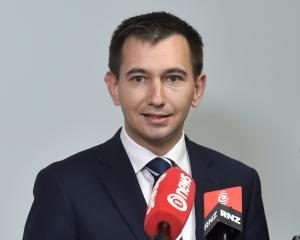
Five southern lung cancer specialists signed an open letter last Friday, describing it as a critical moment for the country’s future health.
MPs who spoke to the Otago Daily Times denied the roll-back would sideline the health of their constituents, arguing that the new government would continue to discourage smoking and that the legislation would have caused a rise in black market cigarettes.
One said the doctors were "catastrophising" the situation.
Dr Blair McLaren was one of those who signed the letter, along with Dr Louise Bremer, Dr Tessa Morris, Dr Shaun Costello and Dr John North.
It was addressed to National MPs Penny Simmonds, Miles Anderson and Joseph Mooney as well as New Zealand First’s Mark Patterson following the revelation the government planned to repeal the law that would have stopped the legal supply of cigarettes to a new generation.
Finance Minister Nicola Willis has acknowledged money saved by scrapping the smoke-free laws will be used to help fund tax cuts.
Friday’s letter said smoking was responsible for 85% of lung cancers and 30% of cancer deaths overall, and the South had some of the lowest survival rates.
The legislation was the most significant step towards preventing the disease they had seen in the course of their medical careers.
"Shortly, the government will vote on repealing this world-leading legislation.
"If you vote to repeal then this will attest that you do not have the long-term health interests of the communities we all serve as your prime motivation and you will be contributing to the continued ill health and deaths of many of your constituents in the future."
Dr McLauren said even with excellent treatment, lung cancer survival rates were low — it was incomprehensible why the policy would be repealed.
Smoking was also responsible for other conditions, such as chronic lung disease and an increased rate of heart disease.
"All of these things are major costs of the health system."
A Treasury briefing paper on the legislation estimated it would create a $5 billion health saving, he said.
The repeal would be "a very real human tragedy"
"We will continue to see patients dying of lung cancer and other smoking-related diseases."
He pushed back against predictions of a black market increase, saying there was "no basis" to think this and and it would show a lack of ability to control crime.
Mr Patterson said the doctors were "catastrophising" the situation.
"I don’t think there is anyone on the planet that doesn’t understand [smoking is] really bad for you."
It would continue to be discouraged, such as with increased tax.
"We don’t want to go totally nanny state."
He and Mr Anderson both argued a black market would spring from the ban.
Mr Anderson said the doctors were "entitled to their opinion" but he did not agree with their comments.
Ms Simmonds and Mr Mooney responded with identical statements acknowledging the concerns of local specialists and saying they were "fully committed" to reducing smoking rates.
There was no evidence for how effective the smoke-free legislation would have been, the statements said.
"There are already extensive educational and health safeguards already in place to stop people taking up smoking, or to encourage them to quit.
"This government will continue to support those measures and we expect to continue reducing the prevalence of smoking over time."












